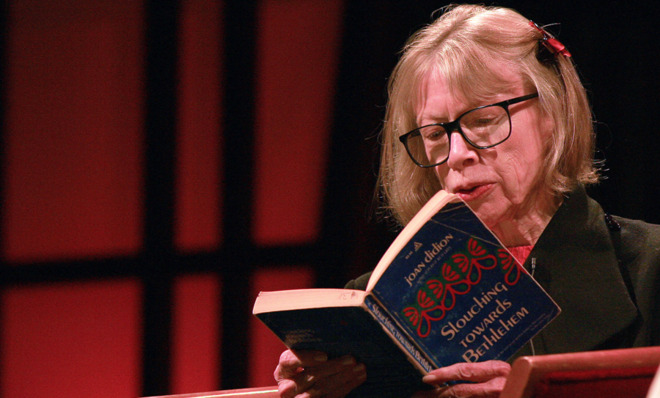Why it's important to keep a notebook
It is a good idea to keep in touch with old selves, Joan Didion once wrote

A free daily email with the biggest news stories of the day – and the best features from TheWeek.com
You are now subscribed
Your newsletter sign-up was successful

I've been doing some research into notebooks and the like. A friend of mine pointed me towards a Joan Didion essay, "On Keeping A Notebook," that appears in Slouching Towards Bethlehem, a collection of her essays.

Written long ago, in the 1960s I think, the essay is still relevant. In fact, you could make an argument that in the world of blogging and Twitter, it's more relevant than ever.
Reading an arbitrary entry from her notebook, "that woman Estelle is partly the reason why George Sharp and I are separated today," Didion goes on to wonder:
The Week
Escape your echo chamber. Get the facts behind the news, plus analysis from multiple perspectives.

Sign up for The Week's Free Newsletters
From our morning news briefing to a weekly Good News Newsletter, get the best of The Week delivered directly to your inbox.
From our morning news briefing to a weekly Good News Newsletter, get the best of The Week delivered directly to your inbox.
Why did I write it down? In order to remember, of course, but exactly what was it I wanted to remember? How much of it actually happened? Did any of it? Why do I keep a notebook at all? It is easy to deceive oneself on all those scores. The impulse to write things down is a peculiarly compulsive one, inexplicable to those who do not share it, useful only accidentally, only secondarily, in the way that any compulsion tries to justify itself. I suppose that it begins or does not begin in the cradle. Although I have felt compelled to write things down since I was five years old, I doubt that my daughter ever will, for she is a singularly blessed and accepting child, delighted with life exactly as life presents itself to her, unafraid to go to sleep and unafraid to wake up. Keepers of private notebooks are a different breed altogether, lonely and resistant rearrangers of things, anxious malcontents, children afflicted apparently at birth with some presentiment of loss. [Slouching Towards Bethlehem]
The point of keeping a notebook, then:
So the point of my keeping a notebook has never been, nor is it now, to have an accurate factual record of what I have been doing or thinking. That would be a different impulse entirely, an instinct for reality which I sometimes envy but do not possess. [Slouching Towards Bethlehem]
Recalling her failure to keep a keep a diary she touches on our ability to shape memories while we codify them.
At no point have I ever been able successfully to keep a diary; my approach to daily life ranges from the grossly negligent to the merely absent, and on those few occasions when I have tried dutifully to record a day's events, boredom has so overcome me that the results are mysterious at best… [Slouching Towards Bethlehem]
But if the boredom of daily events doesn't matter, what does?
I sometimes delude myself about why I keep a notebook, imagine that some thrifty virtue derives from preserving everything observed. See enough and write it down, I tell myself, and then some morning when the world seems drained of wonder, some day when I am only going through the motions of doing what I am supposed to do, which is write — on that bankrupt morning I will simply open my notebook and there it will all be, a forgotten account with accumulated interest, paid passage back to the world out there: dialogue overheard in hotels and elevators and at the hat-check counter in Pavillon...
I imagine, in other words, that the notebook is about other people. But of course it is not. I have no real business with what one stranger said to another at the hat-check counter in Pavillon... My stake is always, of course, in the unmentioned girl in the plaid silk dress. Remember what it was to be me: that is always the point. [Slouching Towards Bethlehem]
I think for Didion her notebook was an escape. She was "brought up in the ethic that others, any others, all others, (were) by definition more interesting than (her)." The notebook was an escape.
A free daily email with the biggest news stories of the day – and the best features from TheWeek.com
[O]ur notebooks give us away, for however dutifully we record what we see around us, the common denominator of all we see is always, transparently, shamelessly, the implacable "I." … [W]e are talking about something private, about bits of the mind's string too short to use, an indiscriminate and erratic assemblage with meaning only for its maker. [Slouching Towards Bethlehem]
In the end the deepest value of notebooks to her was not to remember the line but the memory, "I should remember the woman who said it and the afternoon I heard it." To reconnect with another iteration of herself.
Perhaps it is difficult to see the value in having one's self back in that kind of mood, but I do see it; I think we are well advised to keep on nodding terms with the people we used to be, whether we find them attractive company or not. Otherwise they turn up unannounced and surprise us, come hammering on the mind's door at 4 a.m. of a bad night and demand to know who deserted them, who betrayed them, who is going to make amends. We forget all too soon the things we thought we could never forget. We forget the loves and the betrayals alike, forget what we whispered and what we screamed, forget who we were. I have already lost touch with a couple of people I used to be; one of them, a seventeen-year-old, presents little threat, although it would be of some interest to me to know again what it feels like to sit on a river levee drinking vodka-and-orange-juice and listening to Les Paul and Mary Ford and their echoes sing "How High the Moon" on the car radio. (You see I still have the scenes, but I no longer perceive myself among those present, no longer could even improvise the dialogue.)
…It is a good idea, then, to keep in touch, and I suppose that keeping in touch is what notebooks are all about. And we are all on our own when it comes to keeping those lines open to ourselves: your notebook will never help me, nor mine you. [Slouching Towards Bethlehem]
Like so much of what I read, I'm new to Didion. Slouching Towards Bethlehem, her first work of non-fiction, is interesting throughout.
More from Farnam Street...
-
 Political cartoons for February 16
Political cartoons for February 16Cartoons Monday’s political cartoons include President's Day, a valentine from the Epstein files, and more
-
 Regent Hong Kong: a tranquil haven with a prime waterfront spot
Regent Hong Kong: a tranquil haven with a prime waterfront spotThe Week Recommends The trendy hotel recently underwent an extensive two-year revamp
-
 The problem with diagnosing profound autism
The problem with diagnosing profound autismThe Explainer Experts are reconsidering the idea of autism as a spectrum, which could impact diagnoses and policy making for the condition